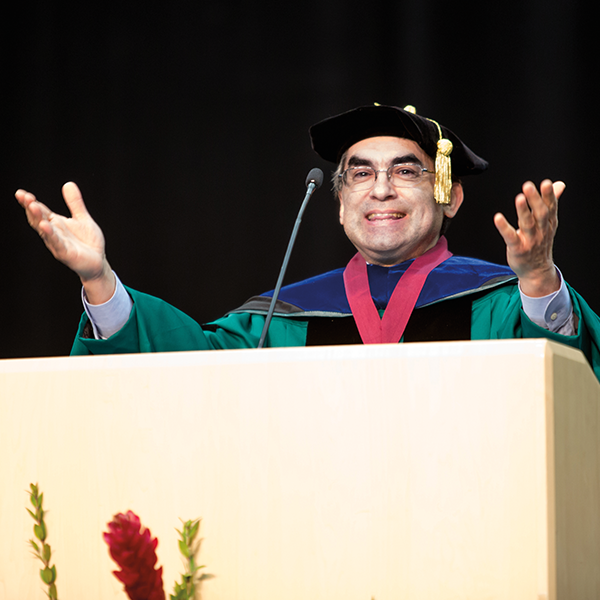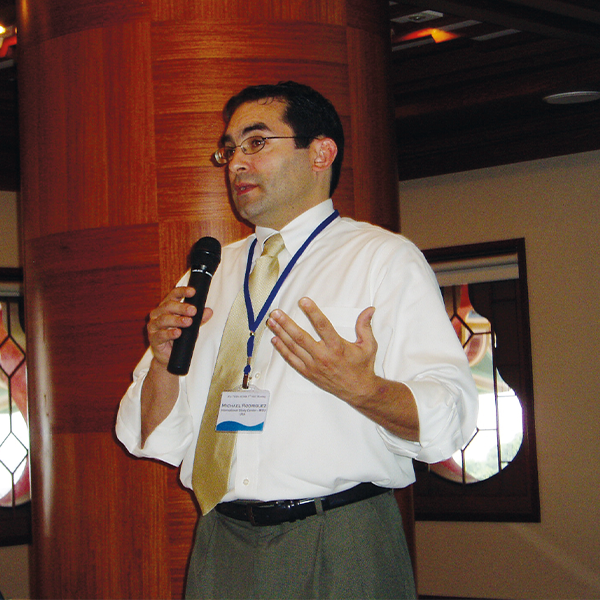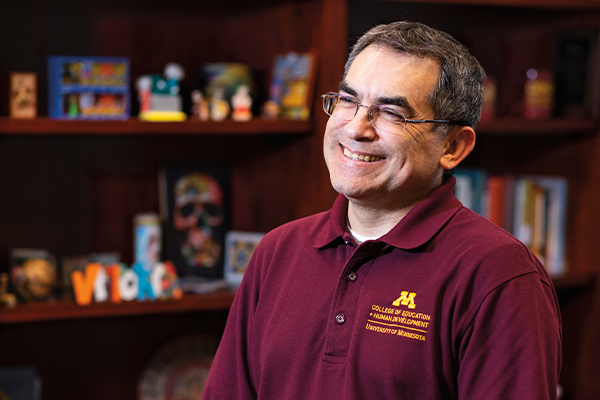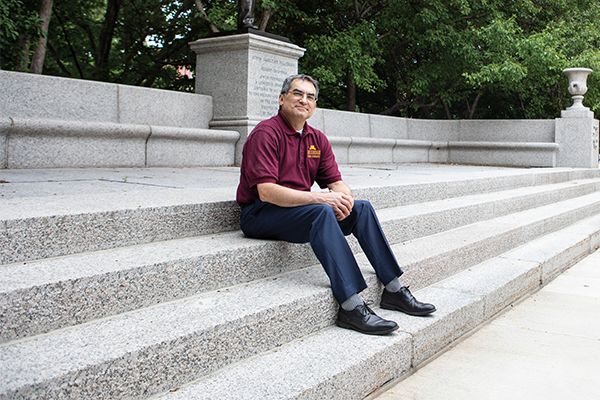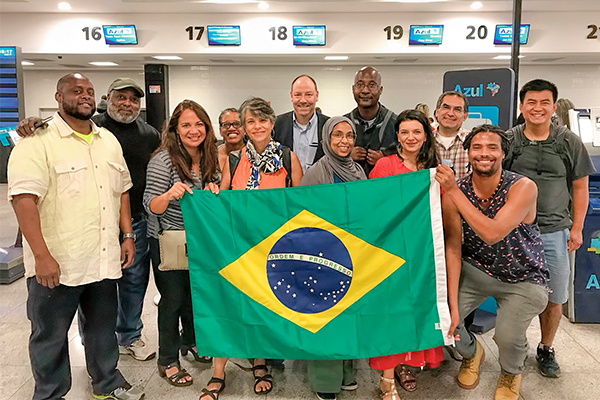What brought you to the University of Minnesota initially?
I am a fifth-generation Minnesotan on my mother’s side, third generation on my father’s side. I am an alumnus of the Morris campus (BA in psychology), the College of Education, Twin Cities campus (elementary education), and Humphrey School (MA in public affairs). Minnesota is home and being able to work at a land-grant, world-class university and be home is a significant privilege.
Your PhD is in measurement and quantitative methods, with an emphasis in educational measurement. How did you get into this area of study and what makes it fascinating for you?
As I explored psychology as an undergrad, I was most interested in the area of cognitive learning and the role of social context. During college, I spent three summers as a camp counselor at Camp Algonquin in Rhinelander, Wisconsin. Camp Algonquin had a learning center where students spent part of their day aside from canoeing, archery, tennis, and other camp activities. In my second two summers there, I also spent time in the learning center, applying their model of reading instruction to promote stronger reading skills with students. Even in my masters’ program, I studied public policy with a focus on education policy. Then I was able to work at the Wilder Research Center in St. Paul, where I supported efforts to evaluate and study educational intervention programs in diverse communities and settings. In all these settings, I always felt like I didn’t know enough to make a real impact—then I learned about the field of psychometrics and educational measurement and assessment. I chose that as my doctoral field and found every bit of it compelling—but I have a particular interest in classroom assessment. Educators at all levels can uniquely connect student experience and context to disciplinary knowledge and practices through classroom assessment activities. This holds the greatest hope for improving educational outcomes across communities, but it requires that teachers deeply know their students, so that connections to the content can be infused with the cultural and linguistic disciplinary knowledge and practices that students bring with them into the classroom.
Left: Michael gives the keynote address at the 2019 CEHD Commencement. Right: Michael helps graduating student Kory Vue with his regalia.
You are the founding director of the Educational Equity Resource Center, which was created in 2015 with a focus on disparities in education opportunities and outcomes. What have been some of the results of the efforts of the center and where is work still particularly needed?
When I was appointed as Campbell Leadership Chair in Education and Human Development, I was invited to contribute to President Kaler’s agenda around addressing education achievement gaps. I worked closely with Julie Sweitzer, who was the director of the College Readiness Consortium, and we created the center. It was largely an attempt to organize the many efforts across the campus and the University system around education equity. We created a website to provide access to over 140 faculty and researchers across the system addressing various aspects of achievement and opportunity gaps [gap.umn.edu] and an interactive map of the many education equity programs and initiatives in schools across the state [gap.umn.edu/resources]. Over two summers, we held education equity in action convenings, bringing national experts to work with hundreds of Minnesota educators and education leaders on various topics that have promoted education equity. We will continue to expand these efforts now that I am in the dean role—we clearly have a great deal more to do.
Having served as interim dean for some time and now being selected to the post, what are some of the challenges you foresee, both for you as dean and for the college in general? In other words, what keeps you up at night?
The impact of the pandemic and ongoing racial injustice with acute recognition of racism have been intertwined during the past year—resulting in complex contexts that shaped many aspects of life. How we re-enter work, research, teaching and learning, and life on campus will require nuanced attention. Supporting student learning and social, work, and family needs will be paramount among staff. Competition for new faculty and staff will be deeper than ever, as every college and university will be hiring. Our ability to attract and retain faculty, staff, and students of color and those from Indigenous heritage will be critical to our ability to deliver high-quality, world-class programming, research, service, and outreach. Diversity, equity, and inclusion are not just goals for the sake of diversity, equity, and inclusion—they are essential components of what we do as a college and important aspects of how we achieve social and racial justice.
What are some of your short-term goals for the college? Long-term? Are there particular areas of strength of the college that you feel have not been fully emphasized?
Short-term goals for CEHD focus on reentry and return to campus. We will need to attend to the well-being of the CEHD community more than ever and work together to achieve our individual and collective goals around teaching and learning, research and discovery , and service and outreach. We also have so much to offer local and regional communities, as well as the state and global communities; partnerships will continue to be built and explored. Our longer-term goals will focus on partnerships and expansion of access to our programs, courses, tools, and resources. The CEHD community creates so much, we struggle getting our discoveries in the hands of practitioners that could use them. Through leveraging what we’ve experienced and learned in learning technologies, we will continue to elevate our ability to enhance teaching and learning in classrooms and remotely through novel and interactive course delivery off campus. On the tools and resources side, our Educational Technology Innovations group will continue to work with CEHD researchers and scholars to create software platforms, apps, and other innovative ways to make ideas, tools, resources, curriculum, assessments, and practices accessible to practitioners everywhere. Our efforts around access will have a special focus on meeting the needs of communities that have the least access and the least resources—and by working with diverse communities, we will continue to learn how to do our work and improve lives globally.
In your announcements, you sprinkle in Spanish words and phrases from time to time. What is your impetus for doing this and what has been the feedback you’ve received?
I sometimes worry about using Spanish, as I did not grow up speaking Spanish. When my father and his siblings started school, my grandparents decided that there would be only English spoken in the house, to avoid problems at school. I heard Spanish, mostly mornings when my grandparents were together in the kitchen. I took one year of Spanish in college and couldn’t fit it into my schedule after that. Although I had family and friends along the way that spoke Spanish, it was limited to words and phrases. Then, in 2006, I began working in Guatemala through USAID with the ministry of education on a national assessment project. I worked there for two or three weeks at a time, and a couple of times, I extended my stay for a few more weeks to study at a Spanish language school in Quetzaltenango, the home of the marimba! That is where I developed my Spanish skills—however, I haven’t been using them much since. And now, I work with IGDILabs and we have been developing Spanish language development measures for preschool children—which has again helped my own Spanish skills. I’ve received very strong positive reactions to the inclusion of Spanish words and phrases in messages over the past year. To see our language heritage used in contexts where it has been absent helps us feel seen and acknowledged. Learning is a social activity, and social aspects of life are culturally imbedded, and few things are as cultural as language. We also recognize that cultural and linguistic disciplinary knowledge and practices must be infused in our K-12 and higher education curricula if we are to make real progress as a global society, and to correct past disciplinary neglect and dominant cultural centrism. We have lost out on so much progress and innovation because we fail to value knowledge and practices that have sustained thriving cultures for centuries. So I use Spanish sparingly, to acknowledge my own family traditions, the traditions of my community, and those of some in the CEHD community who are not always seen and heard in the same ways. And, sometimes, a Spanish word or phrase expresses something that you cannot express easily in English…una palabra o frase en Español expresa algo que no se puede expresar en inglés, como raza, buena onda, órale pues, o adelante.
Online and hybrid classes have been a reality for some time, but COVID-19 has now put us into uncharted territory in regard to more flexible arrangements for both students and staff alike. What do you think the future holds for the classrooms and the workplaces of the future?
Our work together will become increasingly flexible, accommodating individual preferences and circumstances in new ways. We are embracing flexible work conditions as we return to campus this fall. We continue to explore options for online programming and degree programs are not only engaging in hybrid delivery, but some employ fully remote access. We see this as an important goal for the college, to improve access. At the same time, we know learning is a social activity, so we work hard to maintain the social aspects of learning in all delivery modes. And we will continue to be committed to on-campus learning and working environments that support in-person interactions. We regularly see that a lot of work and progress can be achieved through those casual conversations in the hallway, in the doorways of offices, or while sitting on the knoll in front of Burton Hall.
Applying what you just said to previous responses, what challenges will future classroom and work environments face when confronting educational inequities or institutional racism? What should we be thinking about now to avoid possible future intractable problems?
As we increase accessibility to programs and activities of the college, we have to be diligent in considering all individuals, particularly those that come from communities that have historically had the least access. I am a believer in the principles of targeted universalism, that is, by targeting access to those with the least access, we create greater universal access across the board. This allows us to set broad goals and pursue them through targeted processes, acknowledging, identifying, and dismantling power structures that have created barriers and resulted in policies and practices that depend on and reinforce othering. There are also social, racial, and environmental justice aspects to these efforts, beyond the simple idea that innovation and progress depend on the diversity of ideas, experiences, views, and expressions. Our future learning and working environments will be successful if we make progress on reducing othering and increasing belonging, achieve broad goals through targeted efforts, and realize greater innovation and progress through inclusion.
Finally, where do you draw your motivation? What are you the most excited about as the new dean?
The determination and commitments of CEHD students, staff, faculty, and community partners motivate me. I am inspired by the contributions members in our community have made, and moved by the unmet needs, not only in our own backyard, but across the globe. I need to be assured that when an organization, leader, or community member calls on us in CEHD or the University of Minnesota, we are ready to answer the call, and to do so through partnership and collaboration. When we can connect in meaningful ways with individuals, organizations, and communities, co-constructing agendas, and blending disciplinary knowledge and practice with local wisdom and cultural and linguistic knowledge and practice, new possibilities are realized and real progress is achieved. The promise of these forms of engaged scholarship and outreach is the main reason I entertained the possibility of being dean. I know CEHD has the capacity to surpass these goals—just look at the many examples of community-embedded work in CEHD Connect over the years.
Story by Kevin Moe | Photos courtesy of Erica Loeks, TJ Turner, Clara Metzger, Courtesy of Educational Psychology, Drawing by Matthew Uses Knife, Marina Aleixo, International Initiatives | Fall 2021
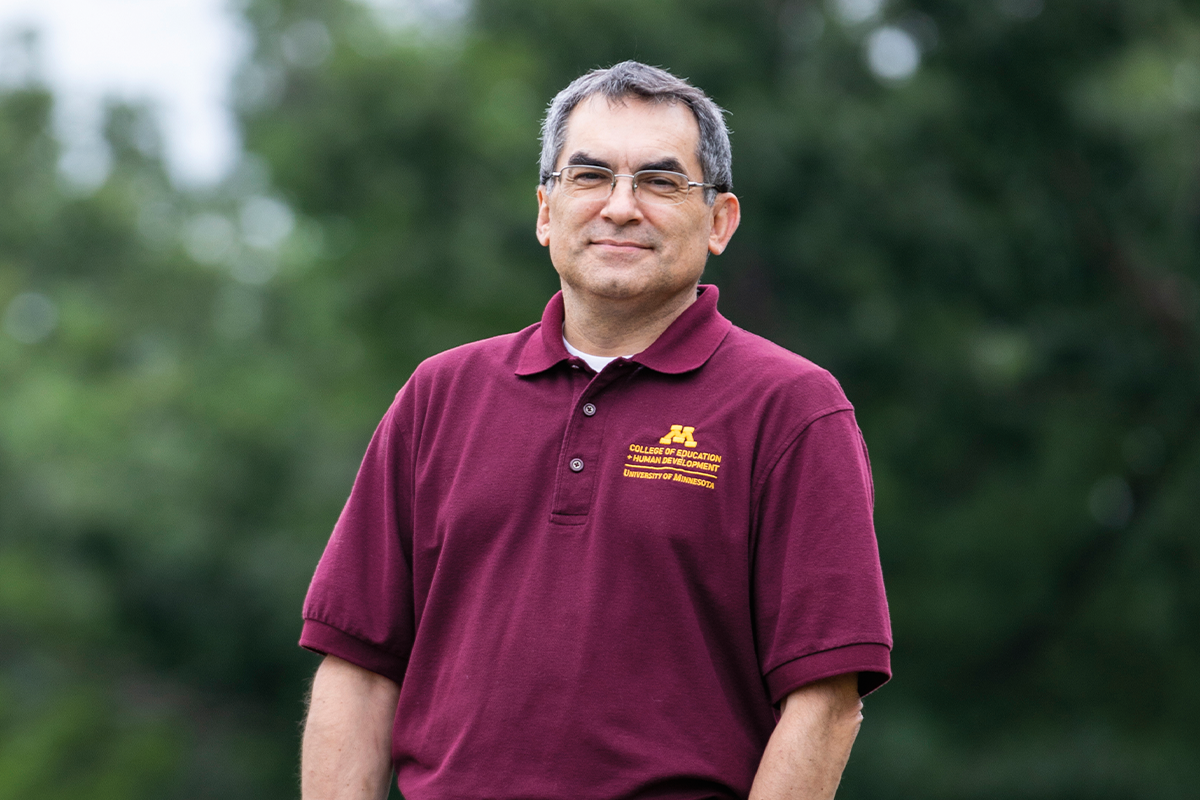 Dean Michael C. Rodriguez
Dean Michael C. Rodriguez 